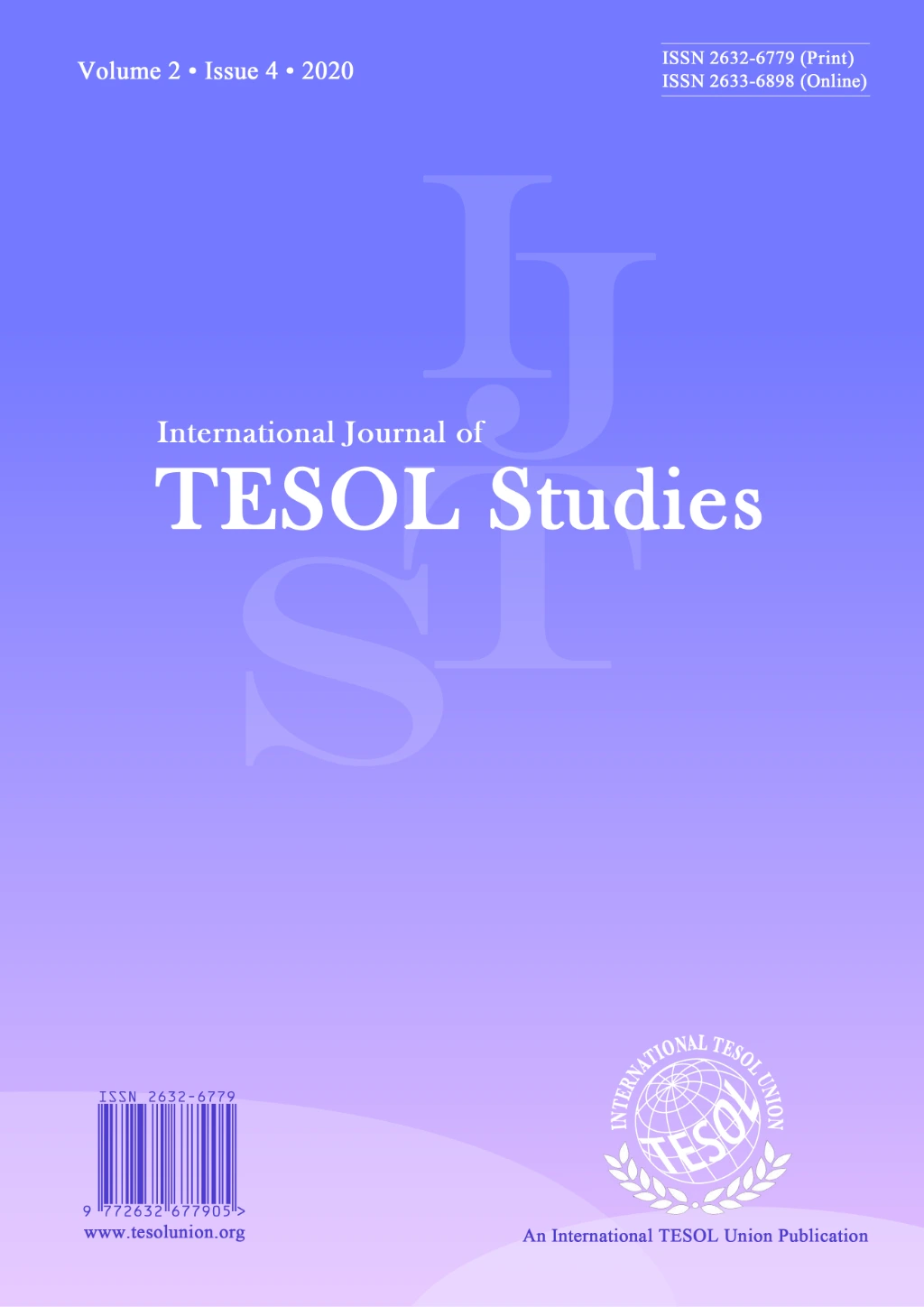2632-6779 (Print)
2633-6898 (Online)


Scopus
Ulrich’s Periodicals Directory (ProQuest)
MLA International Bibliography
MLA Directory of Periodicals
Directory of Open Access Journals (DOAJ)
QOAM (Quality Open Access Market)
British National Bibliography
WAC Clearinghouse Journal Listings
EBSCO Education
ICI Journals Master List
ERIH PLUS
CNKI Scholar
Gale-Cengage
WorldCat
Crossref
Baidu Scholar
British Library
J-Gate
ROAD
BASE
Publons
Google Scholar
Semantic Scholar
ORE Directory
TIRF
China National Center for Philosophy and Social Sciences Documentation
International Journal of TESOL Studies (IJTS) is a fully peer-reviewed international journal published by International TESOL Union and indexed in Scopus (SJR Q1). IJTS publishes both original empirical research and systematic review studies on teaching and learning English as a second and foreign language at all education levels. It is broadly concerned with linguistics applied to education and welcomes contributions in, but not limited to, the following areas:

IJTS is an Open Access journal and all published papers are licensed under the Creative Commons Attribution License 4.0. Users have the right to read, download, copy, distribute, print, search, or link to the full texts of articles in this journal, or to use them for any other lawful purpose. Authors retain copyrights and full publishing rights without restrictions.
There are no article processing charges or submission charges applicable to authors.
2nd Call for Abstract Submissions
(Download the full CFP here)
Theme: Human–AI Partnership in ELT: Designing Human‑Centred, AI‑Enabled Pedagogy
Dates: 30–31 July 2026
Venue: Grand Mercure Singapore Roxy, Singapore
Confirmed Speakers
Jirada Wudthayagorn, Chulalongkorn University, Thailand
Junju Wang, Shandong University, China
Lee Kooi Cheng, National University of Singapore, Singapore
Marie Yeo, SEAMEO RELC
Mark Feng Teng, Macau Polytechnic University, China
Organising Committee
Kevin Xinghua Liu, Advisor (Shanghai Jiao Tong University)
Wong Jock Onn, Chair (National University of Singapore)
Barry Lee Reynolds (University of Macau)
Mark Feng Teng (Macau Polytechnic University)
Shaquille Nazir Ahmad (National University of Singapore, Singapore University of Social Sciences)
Alexius Chia (National Institute of Education)
Daron Loo (Universiti Malaysia Sabah)
Sylvia Sim (National University of Singapore)
Conference Sub-themes
Submissions related to the conference theme may address:
1. Human‑centred approaches to AI integration in ELT
2. Teacher–AI and learner–AI collaboration in language learning
3. AI‑supported development of communicative competence, critical thinking, and creativity
4. Ethical, inclusive, and responsible use of AI in ELT
5. AI and learner autonomy, agency, and motivation
6. Assessment, feedback, and evaluation in AI‑enabled environments
7. Teacher education and professional development for AI‑informed pedagogy
8. Curriculum and materials design in the age of generative AI
9. Other areas in ELT or TESOL
Submission Categories and Guidelines
ITU 2026 features three categories.
1. Paper Presentations
1.1 Format: 25‑minute presentation, inclusive of Q&A
1.2 Abstract length: 250–300 words
2. Lightning Talks
2.1 Format: 10-minute presentation, inclusive of Q&A
2.2 Abstract length: 200–250 words
3. Symposia/Panels
3.1 Format: 55‑minute session consisting of 3–4 panelists
3.2 Abstract length: Symposium overview: 250–300 words; individual presentation summaries: 150–200 words each
Abstract Submissions
Send abstracts to info@tesolunion.org with the subject line: ITU2026 – [Author’s Name].
Those who plan to attend without presenting can simply register for the conference using the provided registration information.
Important Dates
1. Abstract submission deadline: 31 March 2026
2. Notification of abstract acceptance: 15 April 2026
3. Registration opens: February 2026
Registration and Fees (include lunches and teas on both days)
1. Early-bird registration fee: USD 300 / SGD 380 / RMB 2,100 (up to and including 15 May 2026)
2. Regular registration fee: USD 350 / SGD 450 / RMB 2,400 (from 16 May 2026)
Registration details are available in the full CFP here.
Publication Opportunities
ITU 2026 provides full publication opportunities for all attendees.
1. All accepted abstracts will be included in the Proceedings of the International TESOL Union Conference 2026 (with ISBN), published by the International TESOL Union.
2. Second, full papers submitted after the conference will, following peer review and revisions, be included in one of the following publications:
2.1 International Journal of TESOL Studies (Scopus‑indexed, conference special issue)
2.2 TESOL Communications (conference special issue)
2.3 Edited conference volumes (with ISBNs)
Contacts
Please stay updated on the conference by visiting the International TESOL Union website at https://www.tesolunion.org. All questions about submissions, registrations, and other conference‑related issues should be emailed to Wong Jock Onn (National University of Singapore) at jock@nus.edu.sg or Kevin Xinghua Liu (Shanghai Jiao Tong University) at liuxinghua@sjtu.edu.cn.